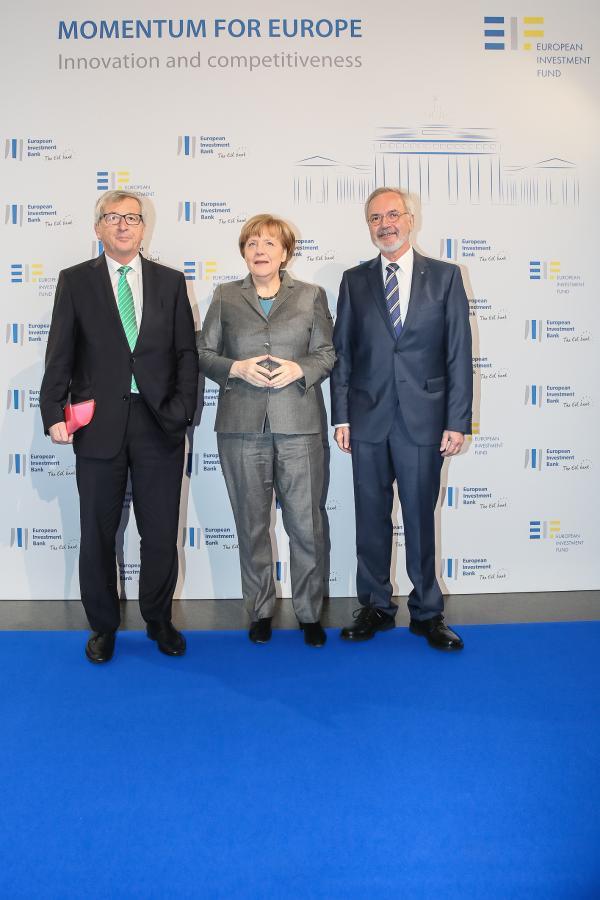
Europe’s annual need for investment in education, innovation and infrastructure can be valued at EUR 500 billion. Opening a high level conference organised by the European Investment Bank today in Berlin, EIB President Dr Werner Hoyer took the leading global economies as a yardstick for Europe’s investment drive. In their following speeches, Federal Chancellor Dr Angela Merkel and EU Commission President Jean-Claude Juncker talked about the innovation policy challenges and ways to reduce the investment gap.
Titled “Momentum for Europe – Innovation and Competitiveness”, the two-day EIB event is dedicated to examining the challenges of financing and promoting innovation in Europe. Werner Hoyer described the expansion of digital infrastructure as Europe’s most urgent investment task, as efficient digital networks form the backbone of the global economy. But because of the rapidly growing volume of data, Europe risks failing to keep up with its competitors. The size of the European market and Europe’s position as one of the world’s leading innovation areas means that Europe cannot afford to fall back on niche markets, but must take its place once more among the global innovation leaders across the board. President Hoyer said: “The growth opportunities that the global market will offer us are enormous. But we must know how to use them!” Smart investment geared to boosting economic efficiency and productivity is urgently needed if Europe does not want to be left behind by innovation-driven economies like the US and large of parts of Asia.
In his following speech, President Juncker talked about the Investment Plan for Europe put forward by the new EU Commission, whose implementation in cooperation with the European Investment Bank is in full swing. He outlined the European Fund for Strategic Investments (EFSI), which is designed to leverage capital of up to EUR 315 billion for viable growth-promoting projects in Europe over a period of three years. The fund will particularly target projects that present a higher risk profile because of their innovative nature but at the same time promise a large element of value added and competitiveness. “Germany needs private and public sector investment. In the EU there is a yawning investment gap. With Europe’s investment offensive, we will leverage an additional EUR 315 billion worth of investment. This will flow directly into sectors of the future like transport and energy infrastructure, digital, health, education, research and innovation. Alongside investment, structural reforms must be resolutely implemented and sound budgetary policies must be pursued", said Jean-Claude Juncker.
Federal Chancellor Angela Merkel stressed the need for a suitable framework for investment and improved economic policy coordination. She pointed out that the Bank had kept well ahead of schedule the desired volume of additional investments following its capital increase: "The European Investment Bank delivers on its promises and sometimes even exceeds them. For example, the Bank pledged investments totalling 180 billion euros and delivered on it way ahead of time,” Merkel said. On the topic of youth unemployment, the German Chancellor stressed that the EIB had helped bring about projects fostering youth employment totalling 13 billion, thereby more than doubling the originally promised 6 billion euros.
After opening presentations by US economist Jeremy Rifkin and Dr Martyn Thomas of the UK’s Royal Academy of Engineering, two panels are examining the challenges of the future innovation economy and the infrastructure of tomorrow. Business leaders are discussing how Europe can in the future better support technology champions, especially innovative firms, and create appropriate financing offers. They will go on to talk about the importance of strategic infrastructure in view of the obstacles frequently faced by private and public sector promoters when carrying out their projects. The EU Commissioner for Research, Science and Innovation, Carlos Moedas, is giving an overview of future policy options. EIB Vice-President Wilhelm Molterer will summarise the outcome of the discussions and close the first day of the conference. The event will continue tomorrow, Tuesday, with workshops on subjects including project finance, the financing of tech firms and new financial instruments.
Financing research, development and innovation, as well as education and training, is one of the EIB’s central remits. Last year alone, the EU bank, together with its venture capital financing subsidiary the European Investment Fund, made available EUR 14.7 billion for projects making an important contribution to innovation and knowledge creation. This brings total financing in this key sector for Europe’s competitiveness in the past six years to around EUR 85 billion. The financing supports the research projects of companies and public research institutes, highly specialised small spin-offs and the expansion of digital networks.
Photographer: EIB ©To be defined
Download original

Photographer: EIB ©To be defined
Download original

Photographer: EIB ©To be defined
Download original

Photographer: EIB ©To be defined
Download original

Photographer: EIB ©To be defined
Download original

Photographer: EIB ©To be defined
Download original

Photographer: EIB ©To be defined
Download original

Photographer: EIB ©To be defined
Download original

Photographer: EIB ©To be defined
Download original

Photographer: EIB ©To be defined
Download original